Effects of a Problem Based Learning Online Program for Nursing Students during COVID-19 Global Pandemic on Learning Outcomes according to Thai Qualifications Framework for Higher Education
Main Article Content
Abstract
As the coronavirus (COVID-19) pandemic spread across the world, Thailand declared a state of emergency throughout the Kingdom. Educational institutions were required to online teaching and learning pedagogies. This pre-posttest one group quasi-experimental research aimed to study the results of PBL-OP on the learning outcomes according to Thai Qualifications Framework for Higher Education. The sample consisted of 153 third-year nursing students. The data were collected using the online questionnaires which consisted of Self-perception based on Thai Qualifications Framework for Higher Education (S-p TQF-HEd) questionnaires, as well as the knowledge test regarding nursing care of patients with neurological disorders. Based on the measurement properties tested, the IOC of the questionnaires ranged from .67-1.00 and the questionnaire reliabilities ranged from .78-.96. The face validity (S-CVI/UA) of knowledge test was .80 and the difficulty index of the test ranged from .20-.62. The research results revealed that after completion of study, students had scores of S-p TQF-HEd and knowledge test at the good level. In addition, the scores after studying were statistically significantly higher than those before studying at the p-value of .05 (t=2.817, p=.005; t=2.652, p=.009; t=5.285, p=.000; t=13.95, p=.000, respectively). In conclusion, the development of the problem-based online learning program should be further promoted and integrated with face-to-face learning as a blended-hybrid learning program.
Article Details
บทความและรายงานวิจัยในวารสารพยาบาลกระทรวงสาธารณสุข เป็นความคิดเห็นของ ผู้เขียน มิใช่ของคณะผู้จัดทำ และมิใช่ความรับผิดชอบของสมาคมศิษย์เก่าพยาบาลกระทรวงสาธารณสุข ซึ่งสามารถนำไปอ้างอิงได้
References
2. Royal Thai Government Prescription on the Administration of the Government in Emergency Situations, BE. 2548 (2005), Published in the Royal Thai Government Gazette, Vol.137, Special Part 69 Ngor 2017, dated March 25, B.E. 2563. [internet]. Bangkok: Royal Thai Government;2020 [Cited 2020 March 25] Available from: http://www.ratchakitcha.soc.go.th/DATA/PDF/2563/E/069/T_0010.PDF.(in Thai).
3. Office of the Higher Education Commission, Ministry of Education. Thai qualification framework for higher education and the practice guideline. [internet]. Bangkok: Office of the Higher Education Commission;2009 [Cited 2020 April 1] Available from: http://www.mua.go.th/users/tqf-hed/news/FilesNews/FilesNews2/news2.pdf.(in Thai).
4. Oducado RMF, Estoque HV. Learning in nursing education during the COVID-19 pandemic: stress, satisfaction, and academic performance. JNP 2021;4(2):143-53.
5. Chamnian M, Chamnian K. Knowledge, attitude and behavior of students in Nakhon Si Thammarat province for using online media in studies. J of Grad VRU 2018;12(2):188-195.(in Thai).
6. Intaranongpai S, Kotchakot J. The learning outcome under the qualifications framework for higher education (TQF) in community nursing practicum subject, bachelor of nursing science. JOPN 2017;9(2):104-114.(in Thai).
7. Turner K, Leungratanamart L, Niranrant S, Janarerux J, Watanakul B, Reunreang T. Twenty first century skills of nursing students of Boromarajonani College of Nursing Chonburi. NJPH 2019;25:178-93.(in Thai)
8. Chaikongkiat P, Niha S, Chantarasiripoot B. 2121 Century learning skills of nursing students: a survey research in Yala. SCNJ 2019;6(1):112-20.(in Thai).
9. Lowlor Y, Poole LB. Introduction to problem based learning. Mc master university. Hand out for the 10th Interdisciplinary Summer Institute, School of Nursing, McMaster University;2016.
10. Faculty of Schools of Nursing under Praboromarajchanok Institute. An instructor manual for organizing the problem-based learning course for schools of nursing under Praboromarajchanok Institute. Nonthaburi: Yutharine Printing Press;2015.(in Thai).
11. Crawford TR. Using problem-based learning in web-based components of nurse education. JNEPR 2011; 11:124-30.
12. Tomaz J, Mamede S, Filho JM, Filho JS, Van der Molen H. Effectiveness of an online problem-based learning curriculum for training family medical doctors in Brazil. Educ Health 2015;28:187-93.
13. Smith AC, Warren JM, Ting SR. Developing online learning environments in nursing education. 3rded. New York: Springer Publishing Company;2014.
14. Kusol K, Somrak K, Thuethong J, Hongsum T. Effects of problem-based learning to enhance learning outcome in accordance with Thai qualifications framework for higher education of nursing students in the subject of leadership and nursing management. JONAE 2017;10(3):39-55.(in Thai).
15. Kusol K, Samienpeth T. Self-directed learning ability as a learning outcomes of problem-based learning of Walailak University Nursing Students. JONAE 2015;8(3):127-38.(in Thai).
16. Photong P, Chansuvarn S, Khachat S, Sripho S. Development of a problem-based instructional model to promote critical thinking of nursing science students and the students’ learning outcomes according to the Thai qualifications framework for higher education. NPUJ 2016;124-32.(in Thai).
17. Saiz-Manzanares MC, Escolar-Llamazares M-C, Gonzales A.A. Effectiveness of blended learning in nursing education. Int J Environ Res Public Health 2020;17(5):1-15.

